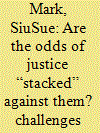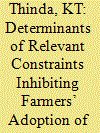|
|
|
Sort Order |
|
|
|
Items / Page
|
|
|
|
|
|
|
| Srl | Item |
| 1 |
ID:
146639


|
|
|
|
|
| Summary/Abstract |
In 2012, the Government of Myanmar passed the Farmland Law and the Vacant, Fallow, Virgin Land Law, with an aim to increase investment in land through the formalization of a land market. Land titling is often considered “the natural end point of land rights formalization.”1 A major obstacle to achieving this in Myanmar is its legacy of multiple regimes which has created “stacked laws.”2 This term refers to a situation in which a country has multiple layers of laws that exist simultaneously, leading to conflicts and contradictions in the legal system. This ambiguity is often manipulated by those who have more access to political and economic resources, particularly those who received large land concessions under the 1988–2010 military regime. In this context, this paper attempts to answer the question: In Myanmar, how do smallholder farmers engage with a stacked legal framework, which is ambiguous and unfairly applied, to defend themselves against land dispossession? The analysis seeks to contribute to the literature on the contest over land control and access through an analysis of how a stacked legal framework can be used to further disenfranchise farmers by elites, or on the contrary, by farmers to gradually reclaim this control through strategic political
|
|
|
|
|
|
|
|
|
|
|
|
|
|
|
|
| 2 |
ID:
174222


|
|
|
|
|
| Summary/Abstract |
In South Africa, the smallholding-farming system is a dominant economic activity in rural communities. This study examines smallholder-farmers’ perceptions in regards to climate changes, in comparison with evidence from meteorological data from 1980–2015, across Vhembe District; data from a questionnaire and recorded meteorological were used. The results reveal that, farmers’ perceptions of climatic conditions are consistent with meteorological details on climatic change. In other words, the study, showed that, farmers’ perceptions using climate indicators, mirror meteorological data. It was concluded that it is imperative for farmers to understand issues such as, temperature and rainfall patterns in order to identify adaptive strategies to the negative impacts of climate.
|
|
|
|
|
|
|
|
|
|
|
|
|
|
|
|
| 3 |
ID:
179112


|
|
|
|
|
| Summary/Abstract |
The adverse effects of climate change on agricultural productivity are on the increase. This study employed both descriptive statistics and the multivariate probit model to estimate factors constraining the adoption of climate change adaptation strategies among smallholder farmers in the study area. The empirical results of the multivariate probit model showed that a lack of knowledge of climate change constraints was influenced by smallholder farmers’ age, gender, off-farm activity, susceptibility and membership in farmer-based organizations. Thus, to improve the adaptive capacity of farmers, government and development partners should work together to improve the conditions under which farmers can gain access to climate change information and suitable agricultural credit as well as policy incentives aimed at lowering the stringent conditions of borrowing in the agricultural sector.
|
|
|
|
|
|
|
|
|
|
|
|
|
|
|
|
| 4 |
ID:
141636


|
|
|
|
|
| Summary/Abstract |
Genetically modified crops alone are not enough to assure that smallholder farmers will prosper, but they can help to improve their livelihoods.
|
|
|
|
|
|
|
|
|
|
|
|
|
|
|
|
| 5 |
ID:
173984


|
|
|
|
|
| Summary/Abstract |
Climate change and variability have direct negative impacts on rural smallholder farmers. These impacts involve extreme climatic events such as excessive temperatures, prolonged droughts and floods which affect people’s livelihoods. This study was conducted in Nkomazi Local Municipality, Mpumalanga, South Africa. The main objective of the study was to investigate indigenous weather and climate indicators used by smallholder farmers and the role of indigenous knowledge in their farming systems. The research used qualitative methods, including focus group discussions and key informant interviews. The findings indicated that farmers observed animal behaviour, plants, atmospheric indicators and human ailments to predict weather.
|
|
|
|
|
|
|
|
|
|
|
|
|
|
|
|
| 6 |
ID:
188941


|
|
|
|
|
| Summary/Abstract |
The socio-economic characterisation of resettled small-holder farmers under the Fast Track Land Reform Programme (FTLRP) in Zimbabwe has blind spots in relation to the emergent transformative social policy features such as ‘social cohesion’, ‘cooperation’, ‘protection’ and ‘accumulation’ which are equally important among land beneficiaries. Using the Sangwe farm, this article departs from the conventional use of the political economy, sustainable livelihoods, human rights-based and neo-patrimonial approaches to experiment with the transformative social policy approach. Using both quantitative and qualitative data in an exploratory research design, the article shows that viewed from the transformative social policy approach, the FTLRP was neither a resounding success nor a complete disaster. The programme actually produced mixed results. The article thus, recommends the use of in-depth, ideologically free and neutral approaches in its analysis so as to reveal its detailed outcomes. Additional studies in which existing land reform policies can be considered in the collective efforts of improving the transformative agenda of the FTLRP across the country are needed.
|
|
|
|
|
|
|
|
|
|
|
|
|
|
|
|
|
|
|
|
|